Federation University: Taxation Law and the Gig Economy Analysis
VerifiedAdded on 2023/03/17
|9
|2533
|90
Essay
AI Summary
This essay delves into the complexities of taxation law, specifically examining its application to the gig economy in Australia. The student analyzes the Australian tax regime's challenges in ensuring tax compliance within this evolving economic landscape, highlighting issues such as tax evasion by freelance and contractual workers, and the difficulties in tracking income. The essay discusses the ATO's efforts, including the Black Economy Taskforce and proposed compulsory reporting structures, while also critically evaluating the gaps in the system and potential drawbacks. It explores the perspectives of various gig economy platforms like Uber and Airbnb, and concludes with recommendations for improvements, such as leveraging intermediaries for data collection and compulsory GST registration to enhance tax reporting and overall efficiency of the tax regime.
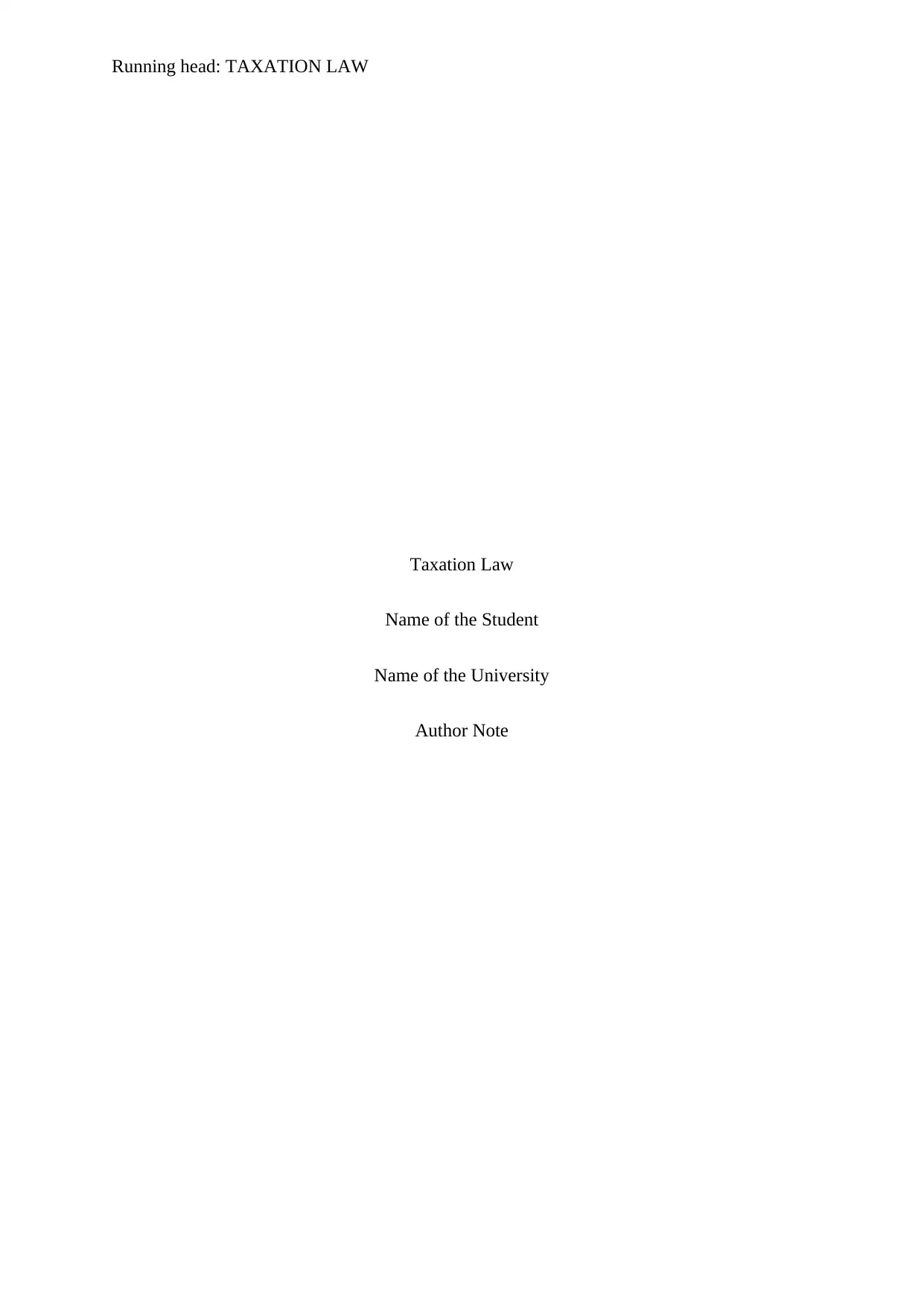
Running head: TAXATION LAW
Taxation Law
Name of the Student
Name of the University
Author Note
Taxation Law
Name of the Student
Name of the University
Author Note
Paraphrase This Document
Need a fresh take? Get an instant paraphrase of this document with our AI Paraphraser
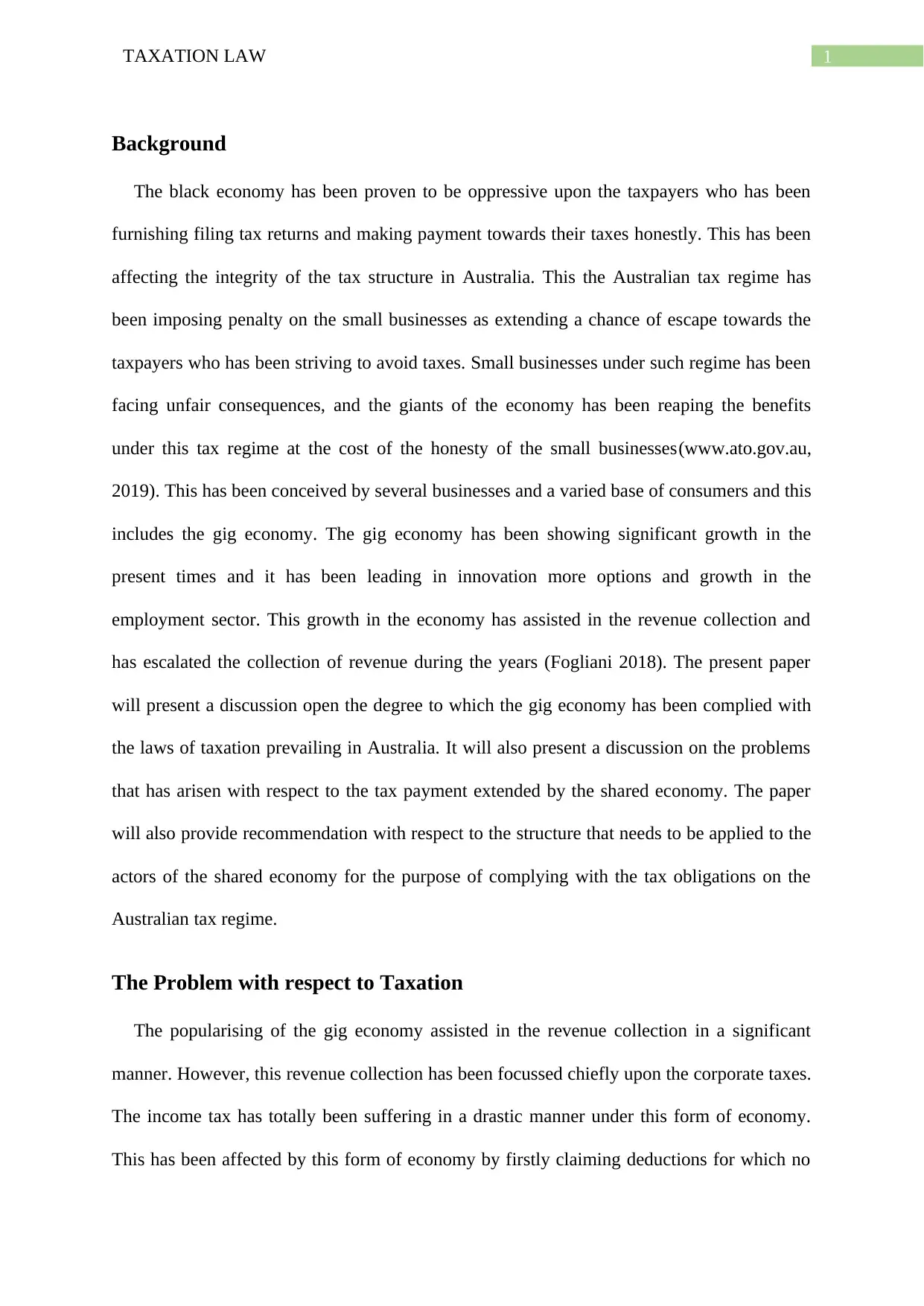
1TAXATION LAW
Background
The black economy has been proven to be oppressive upon the taxpayers who has been
furnishing filing tax returns and making payment towards their taxes honestly. This has been
affecting the integrity of the tax structure in Australia. This the Australian tax regime has
been imposing penalty on the small businesses as extending a chance of escape towards the
taxpayers who has been striving to avoid taxes. Small businesses under such regime has been
facing unfair consequences, and the giants of the economy has been reaping the benefits
under this tax regime at the cost of the honesty of the small businesses(www.ato.gov.au,
2019). This has been conceived by several businesses and a varied base of consumers and this
includes the gig economy. The gig economy has been showing significant growth in the
present times and it has been leading in innovation more options and growth in the
employment sector. This growth in the economy has assisted in the revenue collection and
has escalated the collection of revenue during the years (Fogliani 2018). The present paper
will present a discussion open the degree to which the gig economy has been complied with
the laws of taxation prevailing in Australia. It will also present a discussion on the problems
that has arisen with respect to the tax payment extended by the shared economy. The paper
will also provide recommendation with respect to the structure that needs to be applied to the
actors of the shared economy for the purpose of complying with the tax obligations on the
Australian tax regime.
The Problem with respect to Taxation
The popularising of the gig economy assisted in the revenue collection in a significant
manner. However, this revenue collection has been focussed chiefly upon the corporate taxes.
The income tax has totally been suffering in a drastic manner under this form of economy.
This has been affected by this form of economy by firstly claiming deductions for which no
Background
The black economy has been proven to be oppressive upon the taxpayers who has been
furnishing filing tax returns and making payment towards their taxes honestly. This has been
affecting the integrity of the tax structure in Australia. This the Australian tax regime has
been imposing penalty on the small businesses as extending a chance of escape towards the
taxpayers who has been striving to avoid taxes. Small businesses under such regime has been
facing unfair consequences, and the giants of the economy has been reaping the benefits
under this tax regime at the cost of the honesty of the small businesses(www.ato.gov.au,
2019). This has been conceived by several businesses and a varied base of consumers and this
includes the gig economy. The gig economy has been showing significant growth in the
present times and it has been leading in innovation more options and growth in the
employment sector. This growth in the economy has assisted in the revenue collection and
has escalated the collection of revenue during the years (Fogliani 2018). The present paper
will present a discussion open the degree to which the gig economy has been complied with
the laws of taxation prevailing in Australia. It will also present a discussion on the problems
that has arisen with respect to the tax payment extended by the shared economy. The paper
will also provide recommendation with respect to the structure that needs to be applied to the
actors of the shared economy for the purpose of complying with the tax obligations on the
Australian tax regime.
The Problem with respect to Taxation
The popularising of the gig economy assisted in the revenue collection in a significant
manner. However, this revenue collection has been focussed chiefly upon the corporate taxes.
The income tax has totally been suffering in a drastic manner under this form of economy.
This has been affected by this form of economy by firstly claiming deductions for which no
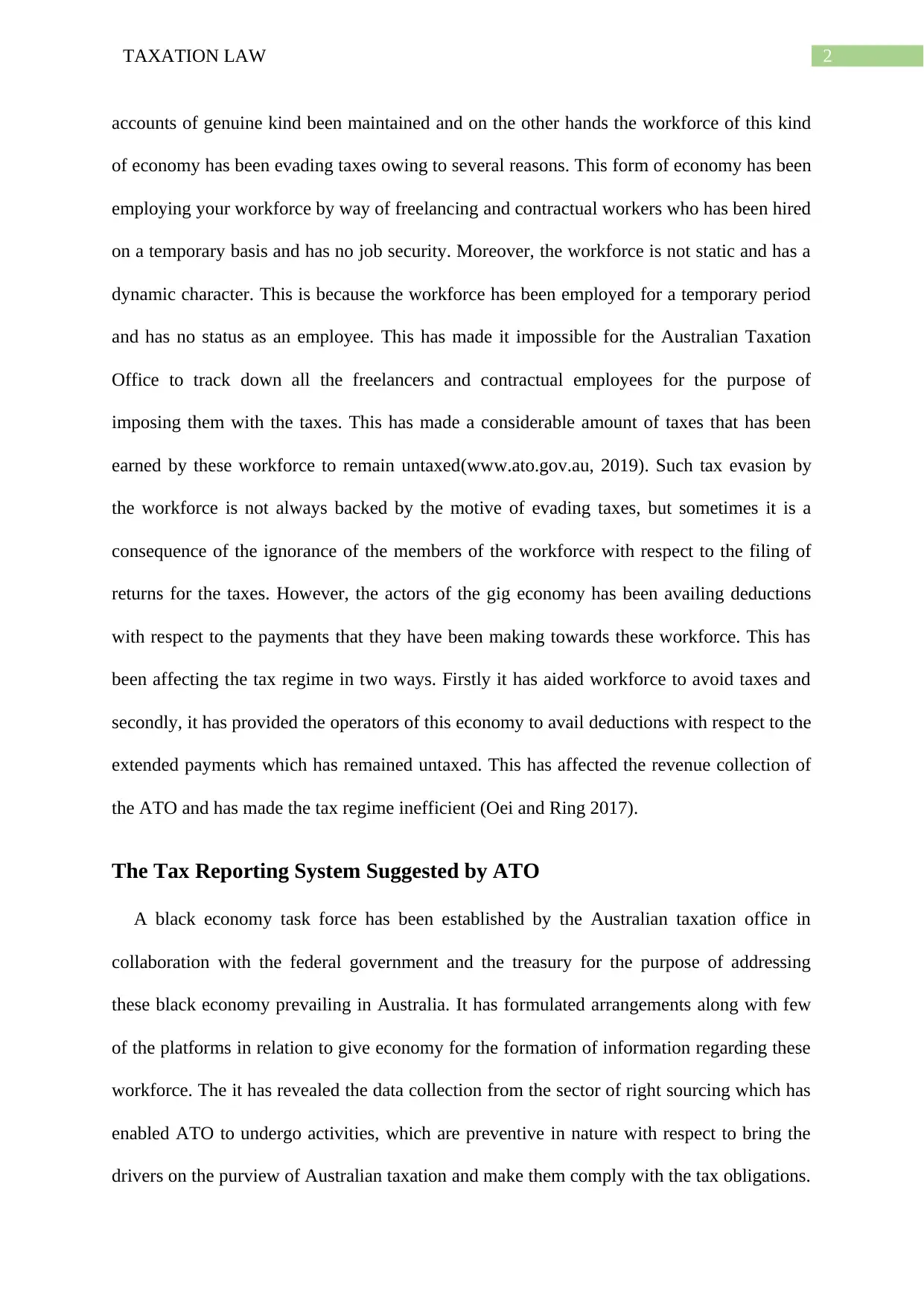
2TAXATION LAW
accounts of genuine kind been maintained and on the other hands the workforce of this kind
of economy has been evading taxes owing to several reasons. This form of economy has been
employing your workforce by way of freelancing and contractual workers who has been hired
on a temporary basis and has no job security. Moreover, the workforce is not static and has a
dynamic character. This is because the workforce has been employed for a temporary period
and has no status as an employee. This has made it impossible for the Australian Taxation
Office to track down all the freelancers and contractual employees for the purpose of
imposing them with the taxes. This has made a considerable amount of taxes that has been
earned by these workforce to remain untaxed(www.ato.gov.au, 2019). Such tax evasion by
the workforce is not always backed by the motive of evading taxes, but sometimes it is a
consequence of the ignorance of the members of the workforce with respect to the filing of
returns for the taxes. However, the actors of the gig economy has been availing deductions
with respect to the payments that they have been making towards these workforce. This has
been affecting the tax regime in two ways. Firstly it has aided workforce to avoid taxes and
secondly, it has provided the operators of this economy to avail deductions with respect to the
extended payments which has remained untaxed. This has affected the revenue collection of
the ATO and has made the tax regime inefficient (Oei and Ring 2017).
The Tax Reporting System Suggested by ATO
A black economy task force has been established by the Australian taxation office in
collaboration with the federal government and the treasury for the purpose of addressing
these black economy prevailing in Australia. It has formulated arrangements along with few
of the platforms in relation to give economy for the formation of information regarding these
workforce. The it has revealed the data collection from the sector of right sourcing which has
enabled ATO to undergo activities, which are preventive in nature with respect to bring the
drivers on the purview of Australian taxation and make them comply with the tax obligations.
accounts of genuine kind been maintained and on the other hands the workforce of this kind
of economy has been evading taxes owing to several reasons. This form of economy has been
employing your workforce by way of freelancing and contractual workers who has been hired
on a temporary basis and has no job security. Moreover, the workforce is not static and has a
dynamic character. This is because the workforce has been employed for a temporary period
and has no status as an employee. This has made it impossible for the Australian Taxation
Office to track down all the freelancers and contractual employees for the purpose of
imposing them with the taxes. This has made a considerable amount of taxes that has been
earned by these workforce to remain untaxed(www.ato.gov.au, 2019). Such tax evasion by
the workforce is not always backed by the motive of evading taxes, but sometimes it is a
consequence of the ignorance of the members of the workforce with respect to the filing of
returns for the taxes. However, the actors of the gig economy has been availing deductions
with respect to the payments that they have been making towards these workforce. This has
been affecting the tax regime in two ways. Firstly it has aided workforce to avoid taxes and
secondly, it has provided the operators of this economy to avail deductions with respect to the
extended payments which has remained untaxed. This has affected the revenue collection of
the ATO and has made the tax regime inefficient (Oei and Ring 2017).
The Tax Reporting System Suggested by ATO
A black economy task force has been established by the Australian taxation office in
collaboration with the federal government and the treasury for the purpose of addressing
these black economy prevailing in Australia. It has formulated arrangements along with few
of the platforms in relation to give economy for the formation of information regarding these
workforce. The it has revealed the data collection from the sector of right sourcing which has
enabled ATO to undergo activities, which are preventive in nature with respect to bring the
drivers on the purview of Australian taxation and make them comply with the tax obligations.
⊘ This is a preview!⊘
Do you want full access?
Subscribe today to unlock all pages.

Trusted by 1+ million students worldwide
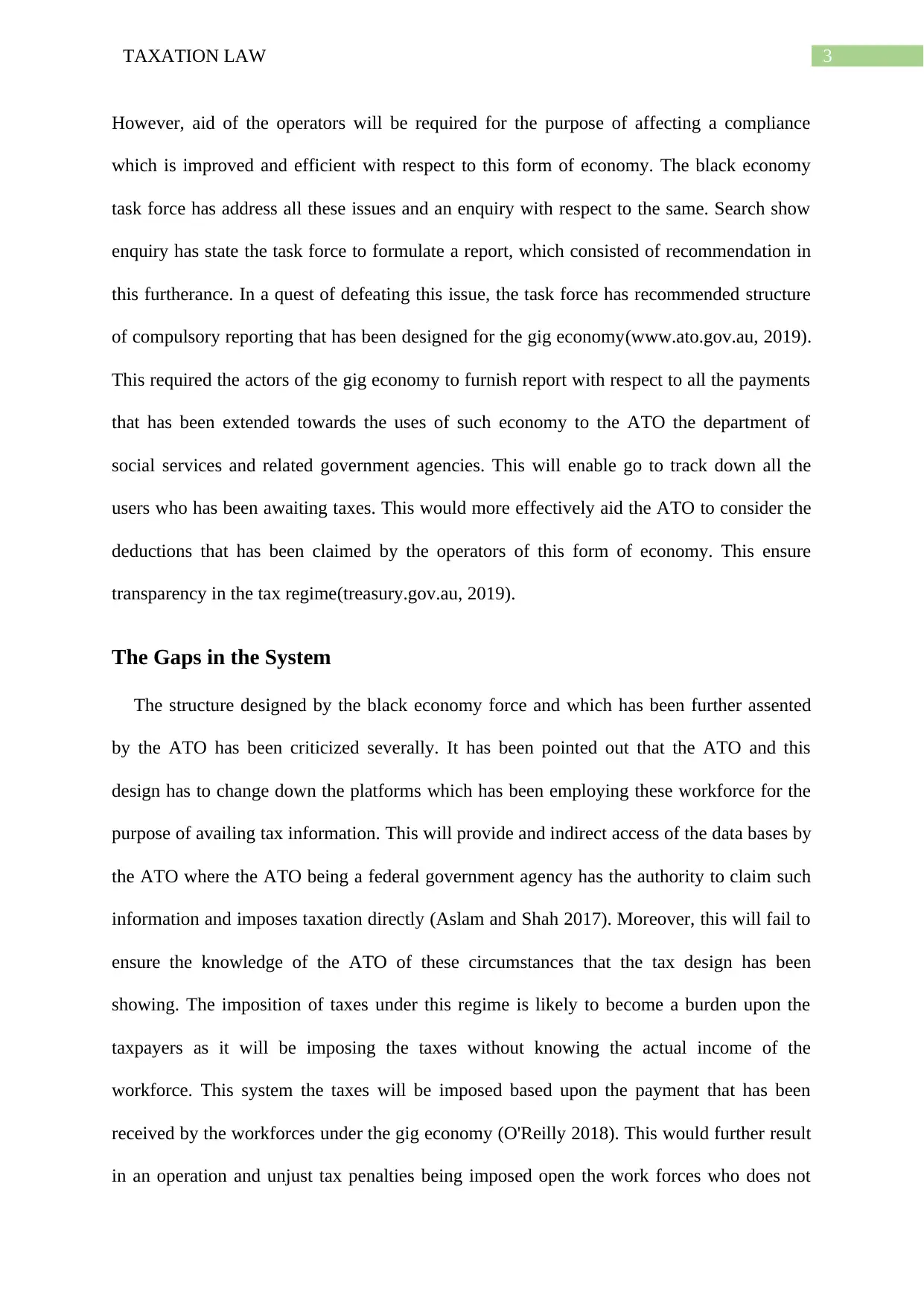
3TAXATION LAW
However, aid of the operators will be required for the purpose of affecting a compliance
which is improved and efficient with respect to this form of economy. The black economy
task force has address all these issues and an enquiry with respect to the same. Search show
enquiry has state the task force to formulate a report, which consisted of recommendation in
this furtherance. In a quest of defeating this issue, the task force has recommended structure
of compulsory reporting that has been designed for the gig economy(www.ato.gov.au, 2019).
This required the actors of the gig economy to furnish report with respect to all the payments
that has been extended towards the uses of such economy to the ATO the department of
social services and related government agencies. This will enable go to track down all the
users who has been awaiting taxes. This would more effectively aid the ATO to consider the
deductions that has been claimed by the operators of this form of economy. This ensure
transparency in the tax regime(treasury.gov.au, 2019).
The Gaps in the System
The structure designed by the black economy force and which has been further assented
by the ATO has been criticized severally. It has been pointed out that the ATO and this
design has to change down the platforms which has been employing these workforce for the
purpose of availing tax information. This will provide and indirect access of the data bases by
the ATO where the ATO being a federal government agency has the authority to claim such
information and imposes taxation directly (Aslam and Shah 2017). Moreover, this will fail to
ensure the knowledge of the ATO of these circumstances that the tax design has been
showing. The imposition of taxes under this regime is likely to become a burden upon the
taxpayers as it will be imposing the taxes without knowing the actual income of the
workforce. This system the taxes will be imposed based upon the payment that has been
received by the workforces under the gig economy (O'Reilly 2018). This would further result
in an operation and unjust tax penalties being imposed open the work forces who does not
However, aid of the operators will be required for the purpose of affecting a compliance
which is improved and efficient with respect to this form of economy. The black economy
task force has address all these issues and an enquiry with respect to the same. Search show
enquiry has state the task force to formulate a report, which consisted of recommendation in
this furtherance. In a quest of defeating this issue, the task force has recommended structure
of compulsory reporting that has been designed for the gig economy(www.ato.gov.au, 2019).
This required the actors of the gig economy to furnish report with respect to all the payments
that has been extended towards the uses of such economy to the ATO the department of
social services and related government agencies. This will enable go to track down all the
users who has been awaiting taxes. This would more effectively aid the ATO to consider the
deductions that has been claimed by the operators of this form of economy. This ensure
transparency in the tax regime(treasury.gov.au, 2019).
The Gaps in the System
The structure designed by the black economy force and which has been further assented
by the ATO has been criticized severally. It has been pointed out that the ATO and this
design has to change down the platforms which has been employing these workforce for the
purpose of availing tax information. This will provide and indirect access of the data bases by
the ATO where the ATO being a federal government agency has the authority to claim such
information and imposes taxation directly (Aslam and Shah 2017). Moreover, this will fail to
ensure the knowledge of the ATO of these circumstances that the tax design has been
showing. The imposition of taxes under this regime is likely to become a burden upon the
taxpayers as it will be imposing the taxes without knowing the actual income of the
workforce. This system the taxes will be imposed based upon the payment that has been
received by the workforces under the gig economy (O'Reilly 2018). This would further result
in an operation and unjust tax penalties being imposed open the work forces who does not
Paraphrase This Document
Need a fresh take? Get an instant paraphrase of this document with our AI Paraphraser
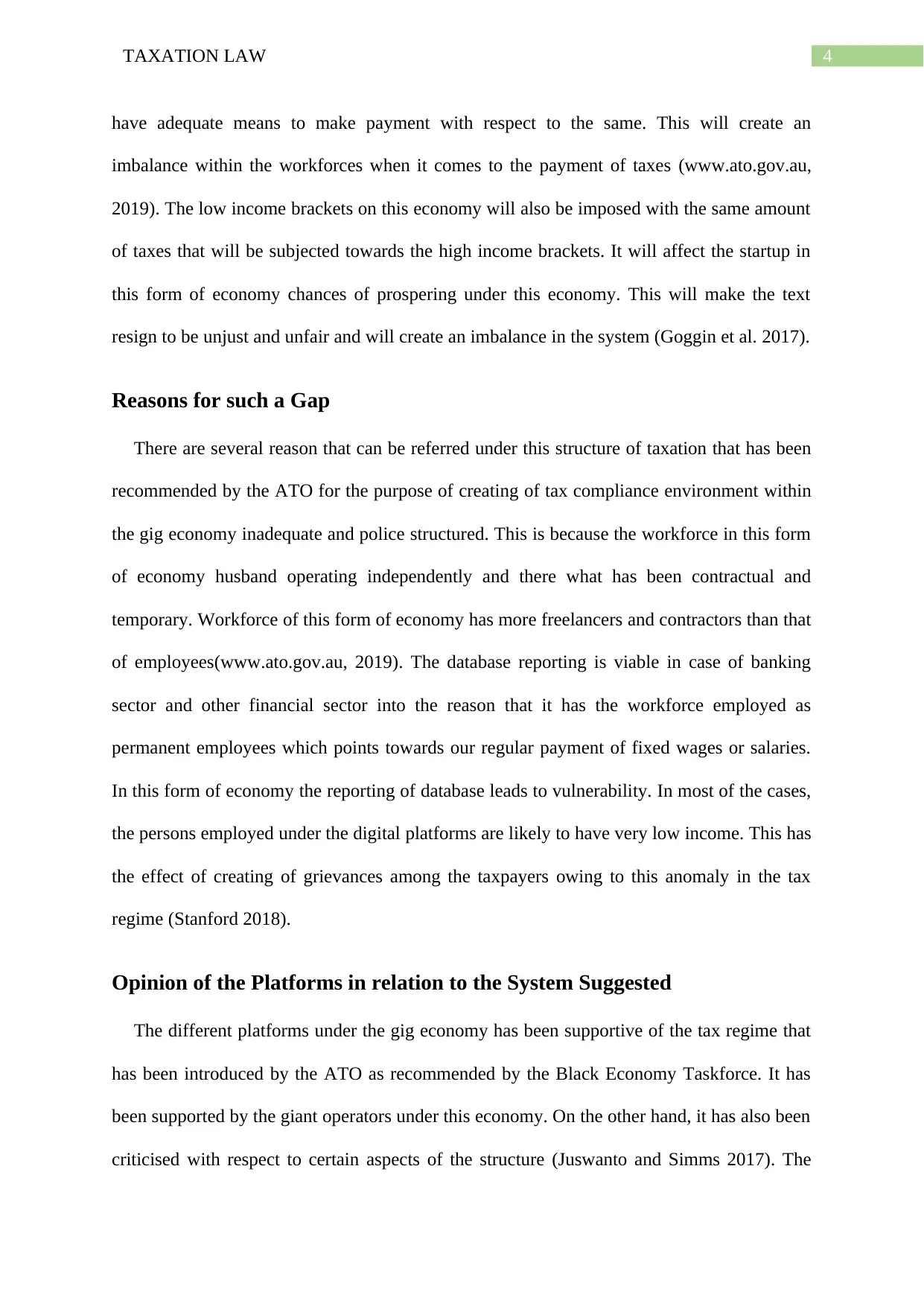
4TAXATION LAW
have adequate means to make payment with respect to the same. This will create an
imbalance within the workforces when it comes to the payment of taxes (www.ato.gov.au,
2019). The low income brackets on this economy will also be imposed with the same amount
of taxes that will be subjected towards the high income brackets. It will affect the startup in
this form of economy chances of prospering under this economy. This will make the text
resign to be unjust and unfair and will create an imbalance in the system (Goggin et al. 2017).
Reasons for such a Gap
There are several reason that can be referred under this structure of taxation that has been
recommended by the ATO for the purpose of creating of tax compliance environment within
the gig economy inadequate and police structured. This is because the workforce in this form
of economy husband operating independently and there what has been contractual and
temporary. Workforce of this form of economy has more freelancers and contractors than that
of employees(www.ato.gov.au, 2019). The database reporting is viable in case of banking
sector and other financial sector into the reason that it has the workforce employed as
permanent employees which points towards our regular payment of fixed wages or salaries.
In this form of economy the reporting of database leads to vulnerability. In most of the cases,
the persons employed under the digital platforms are likely to have very low income. This has
the effect of creating of grievances among the taxpayers owing to this anomaly in the tax
regime (Stanford 2018).
Opinion of the Platforms in relation to the System Suggested
The different platforms under the gig economy has been supportive of the tax regime that
has been introduced by the ATO as recommended by the Black Economy Taskforce. It has
been supported by the giant operators under this economy. On the other hand, it has also been
criticised with respect to certain aspects of the structure (Juswanto and Simms 2017). The
have adequate means to make payment with respect to the same. This will create an
imbalance within the workforces when it comes to the payment of taxes (www.ato.gov.au,
2019). The low income brackets on this economy will also be imposed with the same amount
of taxes that will be subjected towards the high income brackets. It will affect the startup in
this form of economy chances of prospering under this economy. This will make the text
resign to be unjust and unfair and will create an imbalance in the system (Goggin et al. 2017).
Reasons for such a Gap
There are several reason that can be referred under this structure of taxation that has been
recommended by the ATO for the purpose of creating of tax compliance environment within
the gig economy inadequate and police structured. This is because the workforce in this form
of economy husband operating independently and there what has been contractual and
temporary. Workforce of this form of economy has more freelancers and contractors than that
of employees(www.ato.gov.au, 2019). The database reporting is viable in case of banking
sector and other financial sector into the reason that it has the workforce employed as
permanent employees which points towards our regular payment of fixed wages or salaries.
In this form of economy the reporting of database leads to vulnerability. In most of the cases,
the persons employed under the digital platforms are likely to have very low income. This has
the effect of creating of grievances among the taxpayers owing to this anomaly in the tax
regime (Stanford 2018).
Opinion of the Platforms in relation to the System Suggested
The different platforms under the gig economy has been supportive of the tax regime that
has been introduced by the ATO as recommended by the Black Economy Taskforce. It has
been supported by the giant operators under this economy. On the other hand, it has also been
criticised with respect to certain aspects of the structure (Juswanto and Simms 2017). The
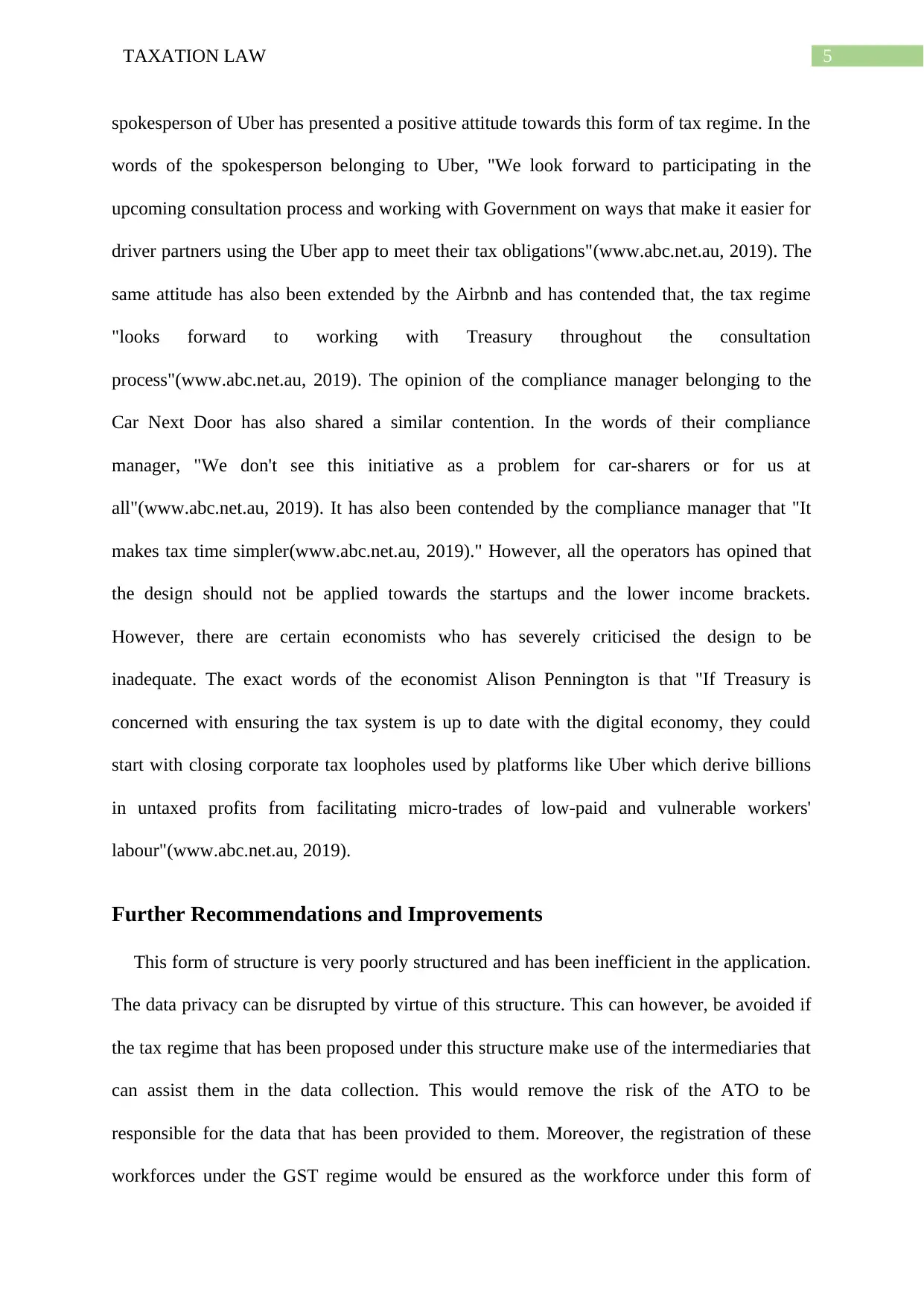
5TAXATION LAW
spokesperson of Uber has presented a positive attitude towards this form of tax regime. In the
words of the spokesperson belonging to Uber, "We look forward to participating in the
upcoming consultation process and working with Government on ways that make it easier for
driver partners using the Uber app to meet their tax obligations"(www.abc.net.au, 2019). The
same attitude has also been extended by the Airbnb and has contended that, the tax regime
"looks forward to working with Treasury throughout the consultation
process"(www.abc.net.au, 2019). The opinion of the compliance manager belonging to the
Car Next Door has also shared a similar contention. In the words of their compliance
manager, "We don't see this initiative as a problem for car-sharers or for us at
all"(www.abc.net.au, 2019). It has also been contended by the compliance manager that "It
makes tax time simpler(www.abc.net.au, 2019)." However, all the operators has opined that
the design should not be applied towards the startups and the lower income brackets.
However, there are certain economists who has severely criticised the design to be
inadequate. The exact words of the economist Alison Pennington is that "If Treasury is
concerned with ensuring the tax system is up to date with the digital economy, they could
start with closing corporate tax loopholes used by platforms like Uber which derive billions
in untaxed profits from facilitating micro-trades of low-paid and vulnerable workers'
labour"(www.abc.net.au, 2019).
Further Recommendations and Improvements
This form of structure is very poorly structured and has been inefficient in the application.
The data privacy can be disrupted by virtue of this structure. This can however, be avoided if
the tax regime that has been proposed under this structure make use of the intermediaries that
can assist them in the data collection. This would remove the risk of the ATO to be
responsible for the data that has been provided to them. Moreover, the registration of these
workforces under the GST regime would be ensured as the workforce under this form of
spokesperson of Uber has presented a positive attitude towards this form of tax regime. In the
words of the spokesperson belonging to Uber, "We look forward to participating in the
upcoming consultation process and working with Government on ways that make it easier for
driver partners using the Uber app to meet their tax obligations"(www.abc.net.au, 2019). The
same attitude has also been extended by the Airbnb and has contended that, the tax regime
"looks forward to working with Treasury throughout the consultation
process"(www.abc.net.au, 2019). The opinion of the compliance manager belonging to the
Car Next Door has also shared a similar contention. In the words of their compliance
manager, "We don't see this initiative as a problem for car-sharers or for us at
all"(www.abc.net.au, 2019). It has also been contended by the compliance manager that "It
makes tax time simpler(www.abc.net.au, 2019)." However, all the operators has opined that
the design should not be applied towards the startups and the lower income brackets.
However, there are certain economists who has severely criticised the design to be
inadequate. The exact words of the economist Alison Pennington is that "If Treasury is
concerned with ensuring the tax system is up to date with the digital economy, they could
start with closing corporate tax loopholes used by platforms like Uber which derive billions
in untaxed profits from facilitating micro-trades of low-paid and vulnerable workers'
labour"(www.abc.net.au, 2019).
Further Recommendations and Improvements
This form of structure is very poorly structured and has been inefficient in the application.
The data privacy can be disrupted by virtue of this structure. This can however, be avoided if
the tax regime that has been proposed under this structure make use of the intermediaries that
can assist them in the data collection. This would remove the risk of the ATO to be
responsible for the data that has been provided to them. Moreover, the registration of these
workforces under the GST regime would be ensured as the workforce under this form of
⊘ This is a preview!⊘
Do you want full access?
Subscribe today to unlock all pages.

Trusted by 1+ million students worldwide
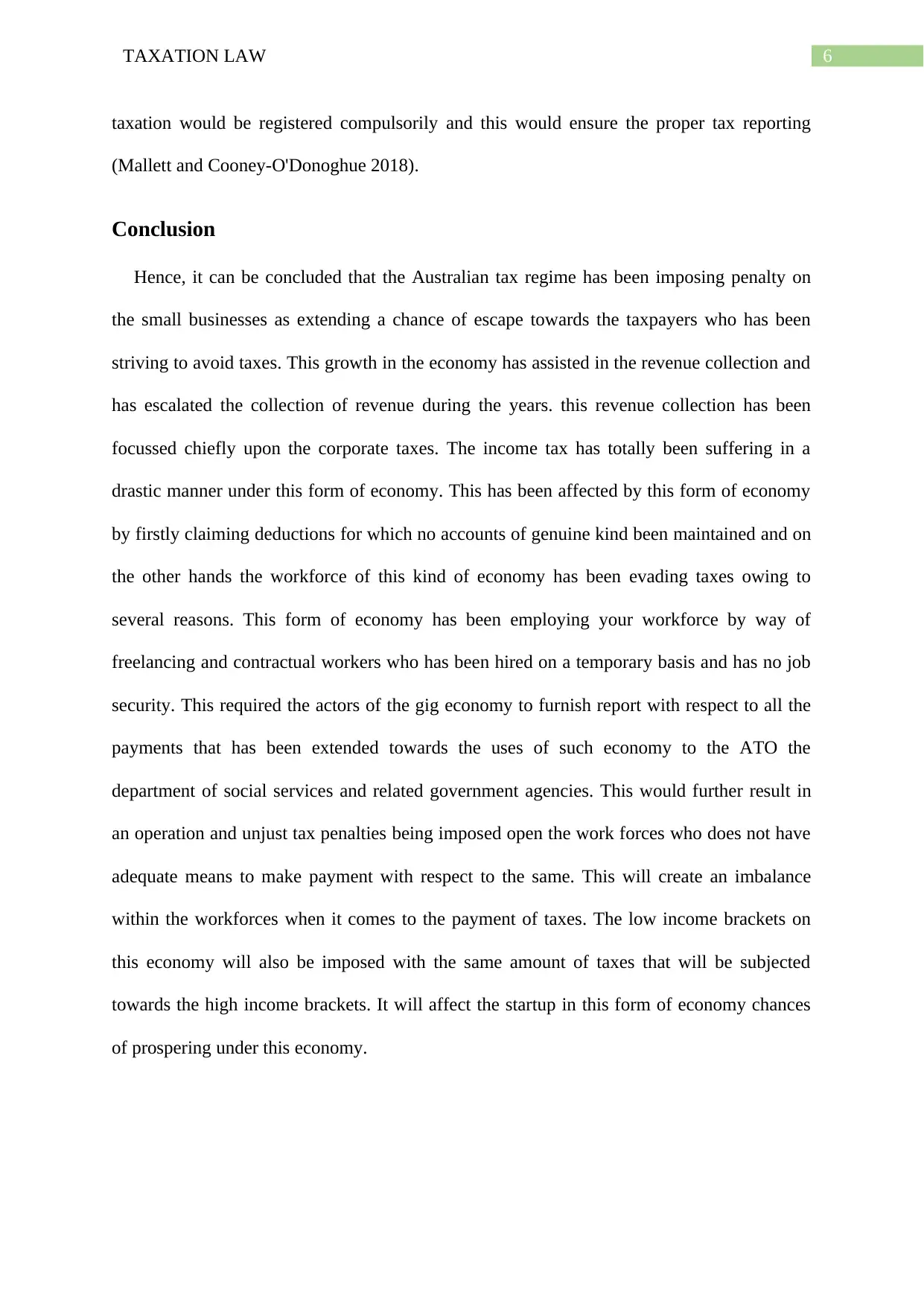
6TAXATION LAW
taxation would be registered compulsorily and this would ensure the proper tax reporting
(Mallett and Cooney-O'Donoghue 2018).
Conclusion
Hence, it can be concluded that the Australian tax regime has been imposing penalty on
the small businesses as extending a chance of escape towards the taxpayers who has been
striving to avoid taxes. This growth in the economy has assisted in the revenue collection and
has escalated the collection of revenue during the years. this revenue collection has been
focussed chiefly upon the corporate taxes. The income tax has totally been suffering in a
drastic manner under this form of economy. This has been affected by this form of economy
by firstly claiming deductions for which no accounts of genuine kind been maintained and on
the other hands the workforce of this kind of economy has been evading taxes owing to
several reasons. This form of economy has been employing your workforce by way of
freelancing and contractual workers who has been hired on a temporary basis and has no job
security. This required the actors of the gig economy to furnish report with respect to all the
payments that has been extended towards the uses of such economy to the ATO the
department of social services and related government agencies. This would further result in
an operation and unjust tax penalties being imposed open the work forces who does not have
adequate means to make payment with respect to the same. This will create an imbalance
within the workforces when it comes to the payment of taxes. The low income brackets on
this economy will also be imposed with the same amount of taxes that will be subjected
towards the high income brackets. It will affect the startup in this form of economy chances
of prospering under this economy.
taxation would be registered compulsorily and this would ensure the proper tax reporting
(Mallett and Cooney-O'Donoghue 2018).
Conclusion
Hence, it can be concluded that the Australian tax regime has been imposing penalty on
the small businesses as extending a chance of escape towards the taxpayers who has been
striving to avoid taxes. This growth in the economy has assisted in the revenue collection and
has escalated the collection of revenue during the years. this revenue collection has been
focussed chiefly upon the corporate taxes. The income tax has totally been suffering in a
drastic manner under this form of economy. This has been affected by this form of economy
by firstly claiming deductions for which no accounts of genuine kind been maintained and on
the other hands the workforce of this kind of economy has been evading taxes owing to
several reasons. This form of economy has been employing your workforce by way of
freelancing and contractual workers who has been hired on a temporary basis and has no job
security. This required the actors of the gig economy to furnish report with respect to all the
payments that has been extended towards the uses of such economy to the ATO the
department of social services and related government agencies. This would further result in
an operation and unjust tax penalties being imposed open the work forces who does not have
adequate means to make payment with respect to the same. This will create an imbalance
within the workforces when it comes to the payment of taxes. The low income brackets on
this economy will also be imposed with the same amount of taxes that will be subjected
towards the high income brackets. It will affect the startup in this form of economy chances
of prospering under this economy.
Paraphrase This Document
Need a fresh take? Get an instant paraphrase of this document with our AI Paraphraser
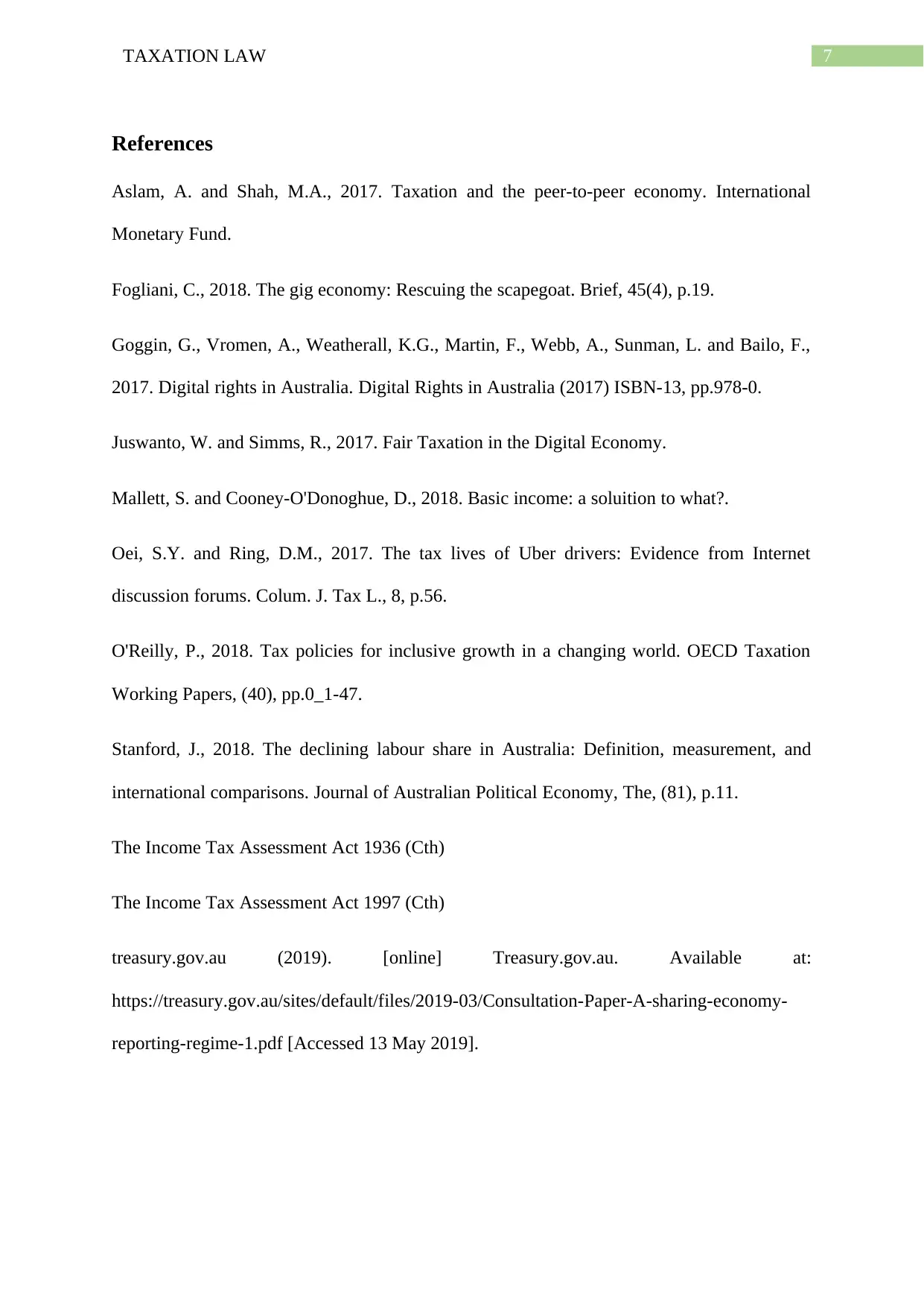
7TAXATION LAW
References
Aslam, A. and Shah, M.A., 2017. Taxation and the peer-to-peer economy. International
Monetary Fund.
Fogliani, C., 2018. The gig economy: Rescuing the scapegoat. Brief, 45(4), p.19.
Goggin, G., Vromen, A., Weatherall, K.G., Martin, F., Webb, A., Sunman, L. and Bailo, F.,
2017. Digital rights in Australia. Digital Rights in Australia (2017) ISBN-13, pp.978-0.
Juswanto, W. and Simms, R., 2017. Fair Taxation in the Digital Economy.
Mallett, S. and Cooney-O'Donoghue, D., 2018. Basic income: a soluition to what?.
Oei, S.Y. and Ring, D.M., 2017. The tax lives of Uber drivers: Evidence from Internet
discussion forums. Colum. J. Tax L., 8, p.56.
O'Reilly, P., 2018. Tax policies for inclusive growth in a changing world. OECD Taxation
Working Papers, (40), pp.0_1-47.
Stanford, J., 2018. The declining labour share in Australia: Definition, measurement, and
international comparisons. Journal of Australian Political Economy, The, (81), p.11.
The Income Tax Assessment Act 1936 (Cth)
The Income Tax Assessment Act 1997 (Cth)
treasury.gov.au (2019). [online] Treasury.gov.au. Available at:
https://treasury.gov.au/sites/default/files/2019-03/Consultation-Paper-A-sharing-economy-
reporting-regime-1.pdf [Accessed 13 May 2019].
References
Aslam, A. and Shah, M.A., 2017. Taxation and the peer-to-peer economy. International
Monetary Fund.
Fogliani, C., 2018. The gig economy: Rescuing the scapegoat. Brief, 45(4), p.19.
Goggin, G., Vromen, A., Weatherall, K.G., Martin, F., Webb, A., Sunman, L. and Bailo, F.,
2017. Digital rights in Australia. Digital Rights in Australia (2017) ISBN-13, pp.978-0.
Juswanto, W. and Simms, R., 2017. Fair Taxation in the Digital Economy.
Mallett, S. and Cooney-O'Donoghue, D., 2018. Basic income: a soluition to what?.
Oei, S.Y. and Ring, D.M., 2017. The tax lives of Uber drivers: Evidence from Internet
discussion forums. Colum. J. Tax L., 8, p.56.
O'Reilly, P., 2018. Tax policies for inclusive growth in a changing world. OECD Taxation
Working Papers, (40), pp.0_1-47.
Stanford, J., 2018. The declining labour share in Australia: Definition, measurement, and
international comparisons. Journal of Australian Political Economy, The, (81), p.11.
The Income Tax Assessment Act 1936 (Cth)
The Income Tax Assessment Act 1997 (Cth)
treasury.gov.au (2019). [online] Treasury.gov.au. Available at:
https://treasury.gov.au/sites/default/files/2019-03/Consultation-Paper-A-sharing-economy-
reporting-regime-1.pdf [Accessed 13 May 2019].
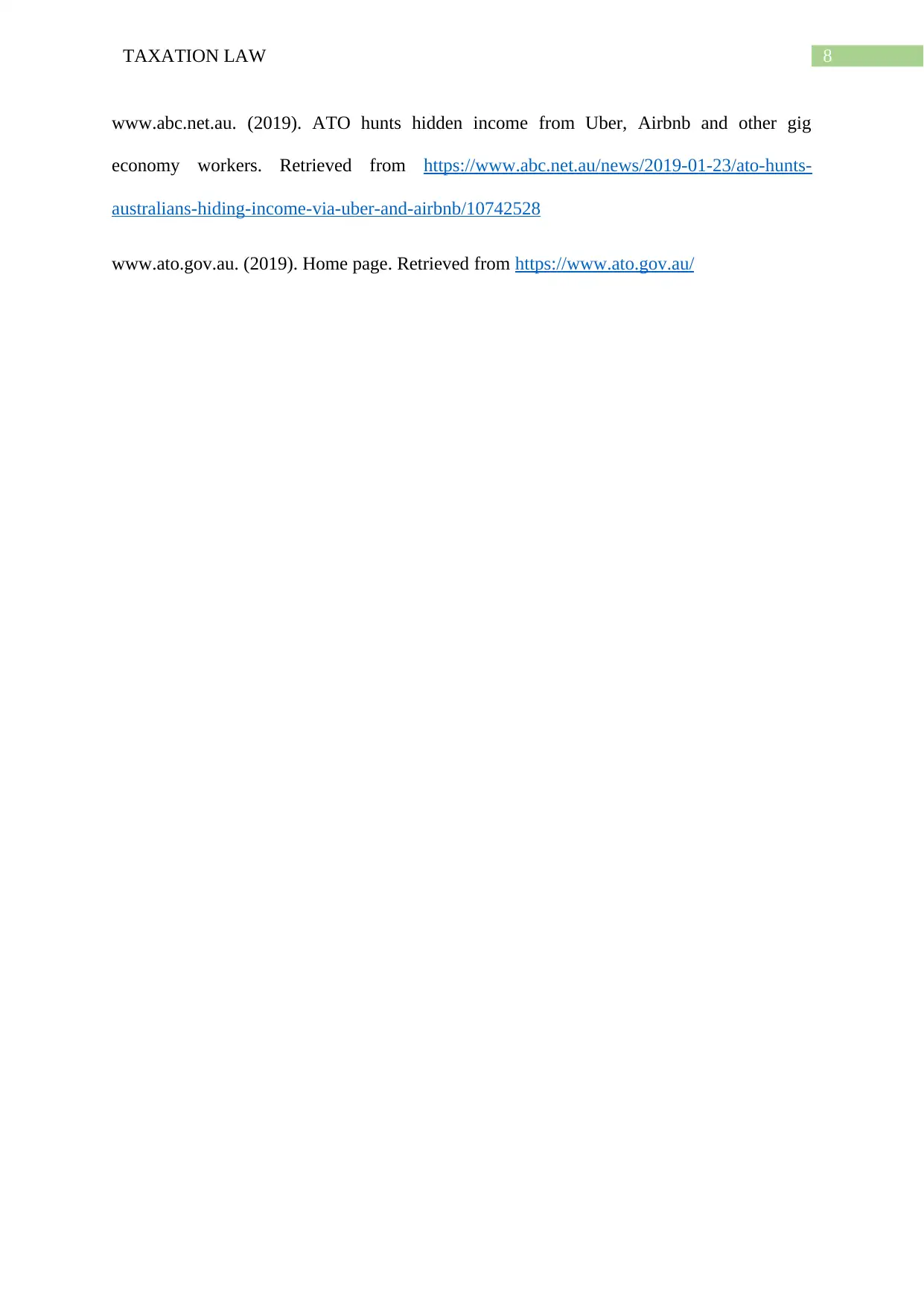
8TAXATION LAW
www.abc.net.au. (2019). ATO hunts hidden income from Uber, Airbnb and other gig
economy workers. Retrieved from https://www.abc.net.au/news/2019-01-23/ato-hunts-
australians-hiding-income-via-uber-and-airbnb/10742528
www.ato.gov.au. (2019). Home page. Retrieved from https://www.ato.gov.au/
www.abc.net.au. (2019). ATO hunts hidden income from Uber, Airbnb and other gig
economy workers. Retrieved from https://www.abc.net.au/news/2019-01-23/ato-hunts-
australians-hiding-income-via-uber-and-airbnb/10742528
www.ato.gov.au. (2019). Home page. Retrieved from https://www.ato.gov.au/
⊘ This is a preview!⊘
Do you want full access?
Subscribe today to unlock all pages.

Trusted by 1+ million students worldwide
1 out of 9
Related Documents
Your All-in-One AI-Powered Toolkit for Academic Success.
+13062052269
info@desklib.com
Available 24*7 on WhatsApp / Email
![[object Object]](/_next/static/media/star-bottom.7253800d.svg)
Unlock your academic potential
Copyright © 2020–2026 A2Z Services. All Rights Reserved. Developed and managed by ZUCOL.





